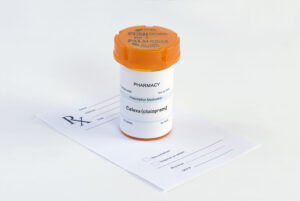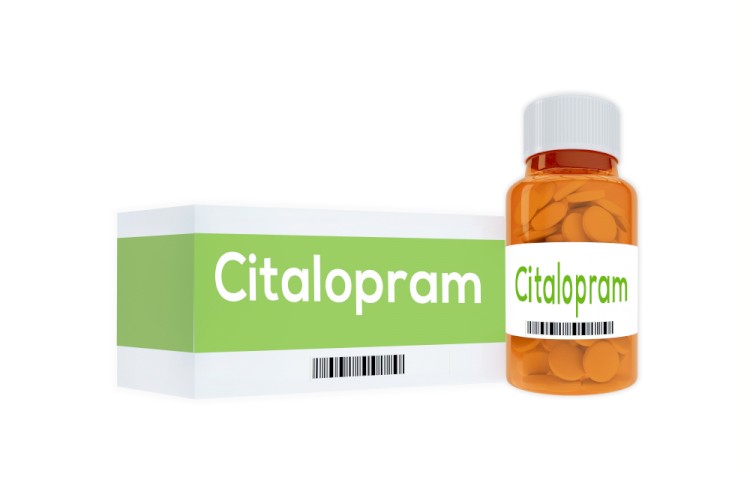Contents
What Is Citalopram (Celexa)?

Citalopram (Celexa) is a drug that FDA approves to treat depression, anxiety, and obsessive-compulsive disorder. Most patients take this medication in pill form. But sometimes doctors may prescribe it as an injection or liquid solution. Side effects may include dizziness, nausea, dry mouth, drowsiness, and diarrhea. It is most often used by adults and adolescents who suffer from these conditions.
How Does It Work?
Citalopram (Celexa) is taken orally with or without food. The medication works by inhibiting the reuptake of serotonin in the brain to increase its availability. Serotonin is a chemical that carries messages between nerve cells. By increasing this available serotonin, it can improve mood and reduce anxiety, stress, fear, anger, agitation, and insomnia related to depression.
This medication specifically targets serotonin levels in the brain. It primarily does this by blocking the absorption of serotonin so that there is more serotonin available to produce neurotransmitters. This medication may also increase the production of neurotransmitters, such as norepinephrine and dopamine. The medication is meant to work in conjunction with therapy and lifestyle changes.
Benefits of Citalopram (Celexa)

Citalopram (Celexa) can be used in many different conditions. It is most often used to treat depression, anxiety, and obsessive-compulsive disorder. One of the benefits of taking Citalopram (Celexa) may be that it is capable of reducing symptoms in all three main conditions. Treatments for these conditions are usually not effective for everyone because each person has different reasons for their symptoms. Citalopram (Celexa) can reduce symptoms in all three conditions by blocking the reuptake of serotonin in the brain. Serotonin is a neurotransmitter that is used to control mood and anxiety. By increasing the availability of serotonin, it is possible to improve symptoms related to these conditions.
Citalopram (Celexa) can be used as a first-line treatment because it is effective in treating depression, anxiety, obsessive-compulsive disorder, and other mental disorders. In many cases, taking this medication may reduce or eliminate other medications you might need for your condition. This medication should only be taken by adults and adolescents who have been diagnosed with one of these conditions.
The direction of Use of Citalopram (Celexa)
One of the directions for use of Citalopram (Celexa) may be that it will not produce an intense withdrawal syndrome when you stop taking it. It can take up to 4-6 weeks for the withdrawal effects to appear and they typically will last for about 1-2 weeks or until your mood stabilizes and then gradually fades away. These symptoms can include fatigue, anxiety, restlessness, vivid dreams, nausea, vomiting, anorexia, agitation, hair loss, and many others. The risk of these symptoms is lower than other medications because it does not produce intense withdrawal syndrome when you stop taking it.
Physical Dependence on Citalopram (Celexa)
Some people experience physical dependence on Citalopram (Celexa) when they stop taking the medication abruptly. This means that they will experience withdrawal symptoms when they stop taking it and may need professional help or additional medications to control them until their body is no longer dependent on the medication. They should be monitored by a doctor while going through this process.
Abuse of Citalopram (Celexa)

In some cases, people have been known to abuse Celexa to get high or use it in ways other than prescribed for medical reasons. When these drugs are used improperly, they can cause serious health problems and life-threatening emergencies that could result in death if not properly treated immediately. When abused, these drugs can lead to overdose and even death because they affect the areas of the brain that control breathing and heart rate. The abuser may experience confusion, agitation, coma, convulsions, respiratory depression and arrest, and even death.
One of the potential risks of Citalopram (Celexa) is that people who cannot get high from other drugs abuse it. Abuse results when a person takes more medication than their doctor suggests or uses it in ways other than how they were originally willing to use. People who abuse this drug may do so in combination with heroin or cocaine in an attempt to enhance certain effects such as euphoria or sedation. They may also take it orally when smoking or snorting these substances instead of using them in their intended way. They could also be administering it intravenously instead of taking the drug by mouth in order to get a stronger effect.
Dosage Recommendation For Celexa

The dosage recommendation of Celexa varies depending on the individual’s medical history and how it interacts with other medications they might be taking. Your doctor will take your complete medical history into consideration when prescribing a dosage. Since this medication is in the antidepressant class, it can take up to six weeks for you to start noticing its effects when you first begin taking it. This means that people who are taking this medication should not expect immediate relief from depression or anxiety when they first begin treatment with Celexa.
The recommended starting dosage of Citalopram (Celexa) is 20 mg taken orally each day in the morning or evening. Dosage may be increased by your doctor after four weeks if needed until you notice an improvement in your condition and then decreased at a steady rate to a minimum effective dose once your mood stabilizes. While many people respond positively to Citalopram (Celexa) when they first begin treatment, this medication may not be effective for everyone. You might find that after a couple of weeks that it is not working to help manage your symptoms and you would need the support of other treatments in order to get appropriate relief from depression or anxiety.
Citalopram (Celexa) with Alcohol
People who are taking Citalopram (Celexa) should avoid drinking alcohol. Because it can increase their risk of experiencing side effects such as dizziness, drowsiness, fatigue, nausea, etc. It’s also important to keep in mind that since Celexa increases the amount of serotonin available to your cells. You should never take another medication that contains dextromethorphan or DXM. You should also avoid taking a medication called a monoamine oxidase inhibitor (MAOI). That too within fourteen days of stopping treatment with Citalopram (Celexa).
Side Effects of Citalopram (Celexa)
Citalopram (Celexa) may cause-

- Sensation of drowsiness
- Dizziness
- Blurred vision
- Dry mouth
- Constipation
- Diarrhea
- Nausea
- Decreased appetite
- Weight loss could lead to malnutrition
Dizziness
One side effect that may occur while taking Citalopram (Celexa) includes dizziness due to low blood pressure which can lead to fainting. The patient can manage it by not standing up or sitting up too quickly and drinking plenty of fluids. If you experience any of these side effects while taking this medication it is important to talk with your doctor as they might need to adjust the dose or change medications.
Dry Mouth
Some lifestyle changes that may help manage some of these side effects include increasing fluid intake throughout the day instead of all at once for those who have problems with dry mouth. Another option is to chew gum or suck on hard candy when experiencing a dry mouth.
Nausea And Constipation
Other side effects that lifestyle changes can neutralize include nausea and constipation. The patient can handle these side effects by eating smaller meals throughout the day instead of fewer large meals. Medications such as Movicol, Imodium, or Senokot can also help treat those who have trouble with constipation from this medication.
Diarrhea
One more side effect of Citalopram (Celexa) is diarrhea. This may require a change in diet to reduce the number of times it is necessary to go to the bathroom during a single day. It is important for patients taking this medication not to overdo it when exercising. This may increase their risk of dehydration which could lead to serious health problems.
Dehydration
Dehydration can also cause muscles not to work as well which would include the muscles that help keep bowel movements moving through the digestive tract. There may be some activities that need to be cut down while taking this medication. Because of the high risk of fainting or falling. These activities include drinking alcohol and becoming dehydrated, participating in sports or other physical activity, operating machinery, or driving a vehicle.
Serious Side Effects of Citalopram (Celexa)
Another one of the side effects of Celexa may be that you experience blurry vision or dilated pupils while under its influence. You could also experience seizures while using this medication and some people have experienced the loss of consciousness after taking Citalopram (Celexa). These symptoms can indicate that your dosage is too high and the patient should report it to a doctor immediately. Antidepressants like these can affect heart rate and blood pressure, which can make you more susceptible to developing other serious health conditions such as heart attack, stroke, or cardiovascular disease. People with these conditions should exercise extra caution when starting this medication because there is an increased risk of coronary artery disease.
Managing Side effects

There are many side effects Celexa shows that last along a spectrum from mild discomfort. A person can manage some of the common side-effects of this medication by implementing several lifestyle changes:
- Cutting down or stopping alcohol use
- Increasing water intake (at least 8 glasses)
- Cutting out caffeine drinks such as soda and coffee
- Make sure not to fall asleep while still on medication (if possible)
- Getting regular exercise
- Not taking any other medications that might cause adverse reactions
Is Citalopram (Celexa) Safe?
Citalopram (Celexa) is generally very safe but it may cause problems for some people according to their health conditions. Patients who are pregnant, breastfeeding, have heart disease, low blood pressure should avoid taking Citalopram (Celexa). Pregnant or breastfeeding women should not take citalopram. But the father can use it during intercourse. Unless otherwise directed by a doctor. Other contraindications for this medication include-
- Patients with liver damage before treatment
- Seizures or epilepsy
- Bipolar disorder
- A history of suicidal thoughts or attempts
Celexa has some side effects that could affect daily life. And also requires a person to visit with their doctor regularly to talk about the symptoms they are experiencing. In order to stay on top of any changes that need to be in their treatment plan. Patients taking this drug should keep their GP up to date on any new symptoms. So they can help find the optimal solution for each individual’s condition.
This medication may be beneficial if you suffer from depression, anxiety, or obsessive-compulsive disorder and you are in need of treatment. You should speak with your doctor if you feel the medication might be right for you.
Conclusion
Citalopram is a prescription that helps treat depression. Depression can be difficult, sometimes debilitating and the most common form of mental illness in America today. Citalopram works by changing levels of serotonin that cause mood swings or feelings of sadness. The medication may help with feelings about your self-worth, thoughts about suicide, lack of energy, concentration problems, and more. If you have any questions please consult your physician for further information on this subject matter. Do not take this medicine before consulting a doctor first. If you are facing any problem with mental health, reach out to our team and get the best solution.
If you are looking for affordable Online Counseling MantraCare can help: Book a trial therapy session


